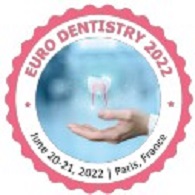
Dr. Fatma Makkeyah
Faculty of dentistry, The British University in Egypt
Title: Evaluation of color stability and bacterial accumulation of lithium disilicate ceramics after ultrasonic scaling
Biography
Biography: Dr. Fatma Makkeyah
Abstract
Objectives: to evaluate the effect of different ultrasonic scaling tips on surface roughness, color stability and bacterial accumulation of lithium disilicate ceramic. Methodology & Theoretical Orientation: Scaling procedure was carried out using ultrasonic scaler (Satalec, Acteon) with stainless steel tip (US), titanium tip (UT) and plastic tip (UP), on disc shaped lithium disilicate samples cemented into a cavity prepared onto the labial surface of freshly extracted bovine teeth (10 samples per group). The samples were stored in coffee solution in an incubator at 37°C for 12 days, equivalent to 1 year of coffee consumption. The surface roughness was measured before and after the scaling using a profilometer and atomic force microscopy. The color parameters were measured before and after scaling and staining procedures using spectrophotometer according to the CIE L*a*b* color order system. The samples were then incubated with Streptococcus mutans suspension. After incubation, the plates with 30 to 300 typical colonies were counted in a colony counter and mean values of colony forming units were obtained (CFU/mL). Findings: The titanium scaling tip showed a statistically significant higher mean values of change in surface roughness ΔRa and bacterial count than the plastic scaling tip. Color changes (ΔE) were not a statistically significant among the groups. The results showed a statistically significant positive (direct) correlation between surface roughness and color change (P= 0.012) and also between surface roughness and bacterial count (P=0.00). Conclusion & Significance: Within the limitations of this study, titanium scaling tips cause irreversible surface alterations of lithium disilcate ceramics which was in direct correlation to the color changes and bacterial accumulation. Recommendations are made that dentists should proceed with caution when scaling lithium disilicate surfaces. The findings of the current study may indicate the need for instruments that can remove plaque and calculus without causing surface damage

